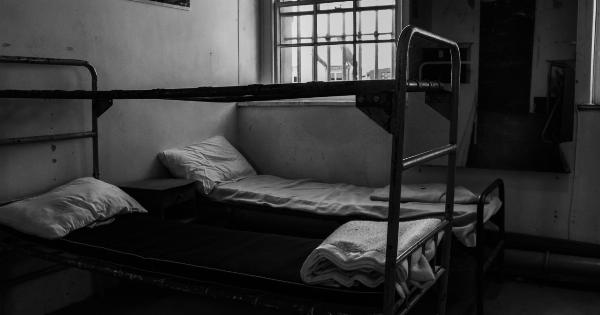Iron, water, and sleep are three essential components that contribute to our overall well-being. However, when any of these elements are lacking, our bodies can manifest various symptoms that can have a significant impact on our health.
In this article, we will explore the symptoms of low iron, dehydration, and lack of sleep, and understand why it is crucial to address these issues promptly.
The Symptoms of Low Iron
Iron plays a vital role in helping our bodies function properly. It is necessary for the production of hemoglobin, which carries oxygen to our body’s cells. When our iron levels drop too low, a condition known as iron deficiency anemia may develop.
Here are some common symptoms to watch out for:.
1.Fatigue
One of the most prevalent symptoms of low iron is extreme fatigue. When our bodies lack iron, it becomes challenging to transport sufficient oxygen to our muscles and tissues, leading to a constant feeling of weakness and tiredness.
2.Shortness of Breath
If you find yourself becoming easily breathless or struggling to catch your breath, it might be due to low iron levels.
Since oxygen is not adequately transported throughout the body, your lungs have to work harder to compensate, resulting in shortness of breath.
3.Irritability
A deficiency in iron can also impact your mood and overall sense of well-being. Irritability, mood swings, and even depression can be associated with low iron levels.
4.Paleness
Iron deficiency can cause a noticeable change in skin and nail color. A person with low iron may appear pale, and their nails may become brittle or concave in shape.
5.Restless Legs Syndrome
Restless Legs Syndrome (RLS) is a condition characterized by an uncomfortable sensation in the legs, often described as a crawling or tingling feeling. Low iron levels have been linked to the development or exacerbation of RLS.
The Symptoms of Dehydration
Staying properly hydrated is essential for maintaining a healthy body. When we do not consume enough fluids, our bodies can become dehydrated. Here are some common symptoms of dehydration:.
1.Increased Thirst
One of the first signs of dehydration is an increased feeling of thirst. Your body attempts to alert you to drink more fluids to compensate for the lack of hydration.
2.Dry Mouth and Lips
Dehydration can cause a dry mouth and cracked lips. Without sufficient water intake, saliva production decreases, leading to discomfort and potential oral health issues.
3.Headaches
When your body is dehydrated, it can result in headaches and migraines. Proper hydration helps maintain the necessary fluid balance within the brain, reducing the likelihood of headaches.
4.
Fatigue and Weakness
Lack of fluids can also make you feel tired, sluggish, and weak. Dehydration puts more strain on your body, making it difficult to perform everyday tasks with energy and enthusiasm.
5.Dizziness and Fainting
If you experience dizziness or fainting spells, it could be a sign of severe dehydration. When your body lacks water, blood pressure drops, reducing the flow of blood and oxygen to the brain.
The Symptoms of Lack of Sleep
Sleep is essential for our physical and mental health. Insufficient sleep can lead to a range of symptoms that can significantly impact our daily lives. Here are some common signs of lack of sleep:.
1.Excessive Daytime Sleepiness
If you find yourself feeling excessively tired during the day, it could be due to a lack of quality sleep. Your body requires sufficient restorative sleep to recharge, repair tissues, and maintain proper cognitive function.
2.Difficulty Concentrating
A lack of sleep often leads to difficulty concentrating, reduced alertness, and impaired cognition. Your ability to focus and retain information may be significantly compromised.
3.Mood Disturbances
Insufficient sleep can leave you feeling irritable, moody, or even depressed. Those experiencing chronic sleep deprivation may be more prone to mood disorders and emotional instability.
4.Increased Appetite and Weight Gain
Lack of sleep can disrupt the balance of hormones that regulate appetite. This disruption can lead to increased cravings, excessive hunger, and potential weight gain.
5.Weak Immune System
When you do not get enough sleep, your immune system may weaken, leaving you more susceptible to infections, illnesses, and longer recovery times.
Addressing Low Iron, Dehydration, and Lack of Sleep
If you are experiencing any of the symptoms mentioned above, it is crucial to address the underlying causes promptly. Here are a few tips to help improve these conditions:.
1.Increase Iron Intake
If you suspect low iron levels, include iron-rich foods in your diet, such as lean red meat, poultry, fish, beans, spinach, and fortified cereals. Consult with a healthcare professional for proper diagnosis and potential iron supplements.
2.Stay Hydrated
Ensure you drink an adequate amount of water daily. Carry a reusable water bottle with you to remind yourself to hydrate throughout the day, especially during physical activity or when exposed to hot weather.
3.Create a Sleep Routine
Establish a consistent sleep schedule by going to bed and waking up at the same time each day. Create a relaxing bedtime routine, limit caffeine and electronic device usage before bed, and ensure your sleeping environment is calm and comfortable.
4.Consider Professional Help
If symptoms persist or worsen, consult a healthcare professional for proper diagnosis and treatment options. They can provide personalized advice tailored to your specific needs.
By addressing low iron, dehydration, and lack of sleep, you can significantly improve your overall health and well-being. Prioritize self-care and establish healthy habits to ensure you are taking care of your body and mind.




























